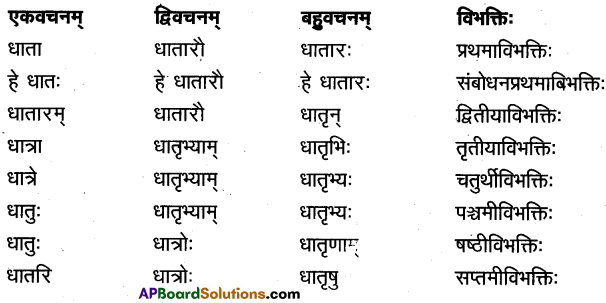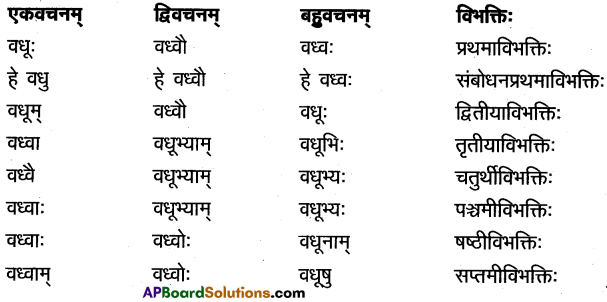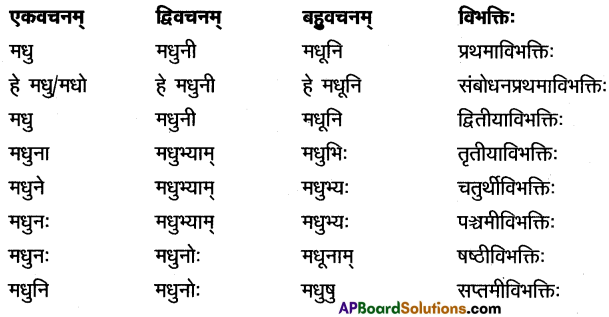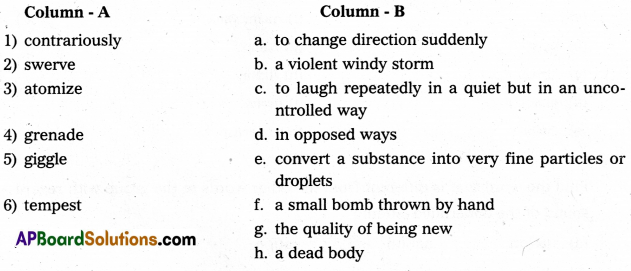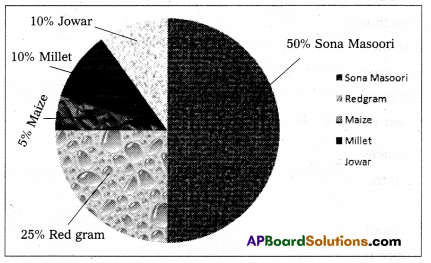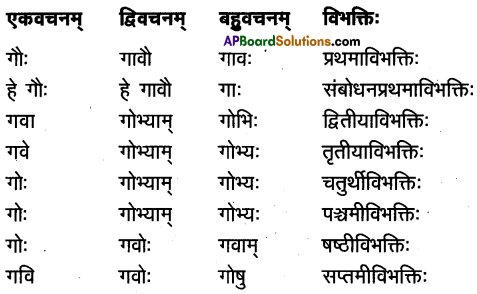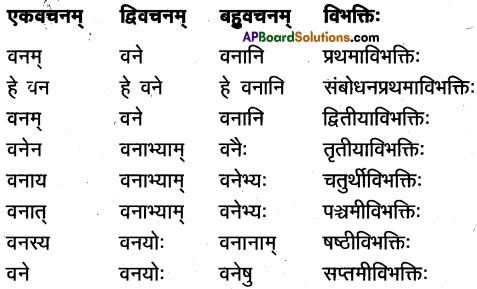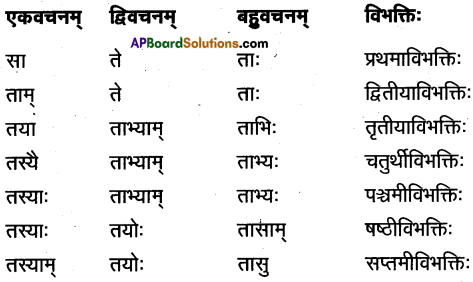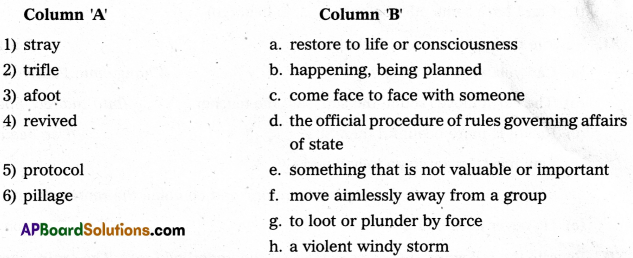Thoroughly reviewing AP Inter 1st Year English Model Papers Set 7 helps in understanding the examiner’s expectations.
AP Inter 1st Year English Model Paper Set 7 with Solutions
Time: 3 Hours
Max. Marks : 100
Section – A
I. Annotate ANY TWO of the following in 10 to 15 lines each:
(a) There can be glory in failure and despair in success.
Answer:
Context: These lines are taken from the lesson “Abraham Lincoln’s Letter to Pis Son’s Teacher”, written by Abraham Lincoln, the noted 16th President of the U.S.A. It is about his appeal to the teacher in instructing a boy of tender age.
Explanation: The author advises the teacher to be careful in his dealing with the boy. The boy should have development1 in all spheres of life. There are many ups and downs in life. Victory and failures are natural in this world. The teacher should prepare the boy to tackle the situation. The boy should know that a failure is always glorious2 and success sometimes may lead to despair3 also. So he should be ready to be practical4 in his life.
General Relevance: The letter is a general appeal to the teachers. The boy should be ready to bear5 the difficulties and expect a success in course of time. Similarly6 he should know that a success may also lead to despair, after wards.
1. అభివృద్ధి
2. ఘనమైన
3. నిరాశ
4. ఆచరణ పూర్వకంగా
5. సహించుట
6. అదేవిధంగా
సందర్భము : “Abraham Lincoln’s Letter to his Son’s Teacher” అనే పాఠము నుండి ఈ వాక్య భాగము తీసుకొనబడినది. దీనిని USA కు 16వ రాష్ట్రపతియైన అబ్రహాంలింకన్ వ్రాశారు. చిన్న వయస్సులో నున్న బాలునికి ఎలా చదువు చెప్పాలి. అనే విషయమై ఆయన చేసిన విజ్ఞాపన.
వివరణ : ఆ బాలుని విషయములో జాగ్రత్తగా వ్యవహరించాలని ఉపాధ్యాయునికి సలహా ఇస్తున్నారు, రచయిత. బాలుడు అన్ని రంగాలలో అభివృద్ధి చెందాలి. జీవితంలో అనేక ఎగుడు దిగుడులుంటాయి. జయము మరియు అపజయము అనునవి సహజము. ‘ఉపాధ్యాయుడు ఆ అబ్బాయి ఈ పరిస్థితిని తట్టుకొనే విధంగా తయారు చేయాలి. ఓటమి అనేది ఎల్లప్పుడు ఘనమైనది అని ఆ అబ్బాయి గ్రహించాలి మరియు జయము అనేది కొన్ని సార్లు నిరాశ కూడా దారితీయవచ్చు. అందుచేత అతడు తన జీవితంలో అన్ని విషయములలో ఆచరణపూర్వకంగా ఉండాలి.
సాధారణ భావన : ఈ ఉత్తరం సాధారణంగా అందరు ఉపాధ్యాయులకు సంబంధించినది. బాలురు కష్టాలను ఓర్చుకొనడానికి సిద్ధంగానుండి, కాలక్రమంలో విజయాన్ని సాధించాలి. అదేవిధంగా కొన్నిసార్లు నిరాశలోనికి కూడా పోవచ్చును అని తెలిసికొనాలి.
(b) Her oxygen was critically low and her Sherpa warned her that she might lose her life.
Answer:
Context : This passage is taken from the prose lesson “She Conquered Everest”. Which was compiled by Dr. B. Sowjanya. It is about the courageous lady Arunima Sinha and her life ambition.
Explanation: Arunima Sinha, the amputee was on her way to the summit of the Everest. Inspite of all the trouble and pain, she could cross the death zone also at a height of 3500 feet. She was not afraid of the dead bodies on the ground. By that time the oxygen was very low and so she was advised1 by her helper, sherpa, to becareful. Somehow she moved forward and erected2 the Indian flag on the summit on 21st May 2013. Thereafter she was saved by her helper who supplied a new cylinder of oxygen.
General Relevance: These lines show how an adventurous individual, encounters3 problems till the end of the trial. Arunima Sinha reached almost the summit but the oxygen seemed to be not sufficient. She did not hesitate to move forward and proved her effi- ciency.
1. సలహానిచ్చెను
2. స్థాపించెను
3. ఎదుర్కొనుట
4. ఆలస్యము చేయుట, వెనుకాడుట
సందర్భము : డా॥ సౌజన్య గారు సేకరించిన, “She Conquered Everest” అనే పాఠములో నుండి ఈ ప్యాసేజి తీసుకొనబడింది. అది, ధైర్యము గల అమ్మాయి అయిన అరుణిమ సిన్హా మరియు ఆమె యొక్క జీవితాశయం గురించినదై యున్నది. వివరణ : కాలుతెగగొట్టబడిన అరుణిమ సిన్హా, ఎవరెస్టు శిఖరాన్నెక్కడానికి ప్రయత్నిస్తోంది. చాలా కష్టాలునప్పటికి ఎలాగో 3500 అడుగుల ఎత్తున ఉన్న డెత్ జోన నన్ను చేరింది. అక్కడవున్న శవాలను చూచి భయపడిపోలేదు. అప్పటికి ఆక్సిజన్ చాలా తక్కువగా’ ఉన్నది. అందుచేత ఆమె సహాయకుడైన షేర్పా ఆమెను జాగ్రత్తగా ఉండుమని సలహానిచ్చాడు. ఏదోవిధంగా ముందుకు పోయి ఆమె 2013 మే 21న ఆ శిఖరం చేరి భారత జాతీయ పతాకం స్థాపించింది. తరువాత సహాయకుడు క్రొత్త ఆక్సిజన్ సిలిండరు తెచ్చి ఆమెను బ్రతికించాడు.
సాధారణ భావన : ఒక ప్రయత్నంలో నున్న సాహస వ్యక్తి చివరి వరకు సమస్యలను ఎదుర్కొంటూనే వుంటాడు అనడానికి ఇది ప్రతీకగానున్నది. అరుణిమ సిన్హా దాదాపు శిఖరం చేరారు కాని ఆక్సిజన్ తక్కువగా కనిపించింది. కానీ ఆమె ముందుకు వెళ్ళడానికి సంకోచించక తన శక్తిని నిరూపించుకొన్నారు.
![]()
(c) India Meteorological Department has strengthened India’s capacity to prepare for and cope with disasters.
Answer:
Context : This line is taken from the essay “Disaster Management” compiled by Dr. A. Madhavi Latha. It is about disaster management. The essay is informative and useful.
Explanation: The writer gives a definition for disaster management. Then she wants to tell about the Meteorological1 Department. Disaster management is a great subject useful for the whole of the world. NIDM was started and some important steps to have awareness2, preparedness and mitigation have been taken up. Forecast and warning informations are given to save people in havoc3. Software application also is arranged by these institutions. So this department is doing a lot for the disaster management.
General Relevance: When there is a problem for the people, it is to be addressed by the government. Here the Meteorological department of the government of this country is working for the safety of the people and so it leads an important role4 in disaster management.
1. వాతావరణ శాస్త్రము
2. ఎరుగుట, తెలిసికొనియుండుట
3. విపత్తు
4. పాత్ర
సందర్భము : డాక్టరు ఏ. మాధవీలత గారు సంకలనం చేసిన “Disaster Management” అనబడే వ్యాసము నుండి ఈ లైను తీసికొనబడినది. అది disaster management ను గురించినదై యున్నది. ఈ వ్యాసము విషయ పరిజ్ఞానము కలది మరియు ఉపయోగకరము.
వివరణ : Disaster management అను పదమునకు చెబుతున్నారు రచయిత. అప్పుడు ఆమె వాతావరణ శాస్త్రము గురించి చెప్పారు. Disaster management అనునది ప్రపంచమంతటికి ఉపయోగపడే విషయము. NIDM ప్రారంభించబడి, విషయ పరిజ్ఞానము, సిద్ధపాటు మరియు నష్టము తగ్గించుకొనుట అను విషయములు చేపట్టి కొన్ని ముఖ్యమైన అడుగులు వేశారు. ముందుగానే ఊహించి గ్రహించుట మరియు Warning Information ఇచ్చి ప్రజలను విపత్తు నుండి రక్షించడానికి ప్రయత్నించారు. ఈ సంస్థలు software కూడా ఉపయోగిస్తున్నారు. కనుక ఈ డిపార్ట్మెంట్ డిజాస్టమేనేజిమెంటు కొరకు చాలా చేస్తున్నది.
సాధారణ భావన : ప్రజలకు సమస్య వుంటే ప్రభుత్వము దానిని తీర్చాలి. ఈ వాతావరణ శాస్త్ర డిపార్ట్మెంట్ వారు ప్రజల క్షేమం కొరకు ప్రయత్నిస్తున్నారు. కనుక disaster management లో అది ప్రధాన పాత్ర పోషిస్తుంది.
(d) Unless we are very strenuous in our conduct and honest in our minds, we cannot make a glorious India.
Answer:
Context: This passage is taken from the lesson “What makes a nation”. C. Rajagopalachari made an inspiring speech at the Nagpur Institute of Technology in the 1948. While giving suggestions to the students, he spoke about some of the important points to be noted by the students.
Explanation: While continuing the speech, the speaker made an appeal1 to the youth. He suggested that the independence, given recently2, should be guarded. Character and conduct should be good. Everybody should understand the responsibility3. There should be no selfish ends. We should be honest if we wanted to bring a glorious India. There should be no wrangling4 or competitive ambitions5. We must strive to construct a powerful nation.
General Relevance: The speaker expected that there should be powerful effort by the youth. Then only we can have a glorious country. It becomes strong.
1. విన్నపము
2. ఈ మధ్యను
3. బాధ్యత
4. గొడవలు
5. పోటీ కాంక్షలు
సందర్భము : సి. రాజగోపాలాచారి రచించిన “What Makes a Nation” అనబడే పాఠం నుండి ఈ లైను తీసికొనబడినది. సి. రాజగోపాలాచారి చాలా భావస్ఫోరకమైన సంభాషణ చేశాడు. ఇది నాగపూరు Institute of Technologyలో 1948లో ఇవ్వబడినది. ఆయన సలహాలనిస్తూ విద్యార్థులకు కొన్ని ముఖ్యమైన గమనింపదగిన మాటలు చెప్పారు.
వివరణ : తన సంభాషణ కొనసాగిస్తూ, ఆయన యువతకు ఒక విన్నపం చేస్తున్నాడు. ఈ మధ్యనే వచ్చిన స్వాతంత్య్రము కాపాడబడాలి. ఒక వ్యక్తి యొక్క ప్రవర్తన, శీలము మంచిగా ఉండాలి. ప్రతివారు తమ యొక్క బాధ్యతను గుర్తించాలి. స్వార్థపూరిత ఆలోచనలుండరాదు. ఘనమైన భారతము కావాలంటే మనం నిజాయితీగా ఉండాలి. పోట్లాటలు, పోటీ కోరికలు ఉండరాదు. ఒక బలమైన జాతిని నిర్మించాలి.
సాధారణ భావన : యువత గట్టి ప్రయత్నము కలిగి ఉండాలని ఆశిస్తున్నాడు. అప్పుడే మనం ఘనమైన భారతము పొందగలము. అది బలంగా ఉంటంది.
II. Annotate ANY TWO of the following in 10 to 15 lines each : (2 × 4 = 8)
(a) “The poor mechanic porters crowding in their heavy burdens at his narrow gate”.
Answer:
Context: These lines are taken from the poem “Common Wealth of Bees” written by Shakespeare. It is extracted from the play Henry V, Act I and Scene 2. The example of a beehive is given here, by the dramatist, to bring a lesson.
Explanation: William Shakespeare gives an interesting comparison between the Common Wealth of Bees and the kingdom of Henry V. There are different bees in the beehive, each working for the good of the hive. The king bee is like the king. There are worker bees always busy collecting honey and taking expedition1 on every garden. There are bees which are like mechanics. They cover the mouths of the holes with wax and keep them shining like gold. They are very careful in keeping the hive without any damage2 or breakage3. The bees returning from the gardens are honeyladen4 and want to keep the honey drops in the narrow holes. The burden of the honey is alighted5 carefully and it is preserved6. Here the business of a soldier bee is described, interestingly.
General relevance: In the poem Shakespeare gives comparison between the honey bee and the common soldier, who tries to safeguard the kingdom with all his might. The comparison at each level is quite apt7.
1. దండయాత్ర
2. నష్టము
3. పగిలిపోవుట
4. తేనెతో నిండిన
5. తేలికయగుట
6. భద్రపరచబడెను
7. తగియున్నది.
సందర్భము : విలియం షేక్స్పియర్ వ్రాసిన Common Wealth of Bees అనే పద్యం నుండి ఈ వాక్యములు తీసుకొనబడినవి. అది హెన్రీ – V, మొదటి Act, 2వ సీను నుండి తీసుకొనబడినది. ఒక తేనెపట్టు యొక్క ఉదాహరణ, ఒక పాఠము కొరకు ఇవ్వబడినది.
వివరణ : Common Wealth of Bees కును, హెన్రీ – V యొక్క రాజ్యమునకును మధ్య పోలికను విలియం షేక్స్పియర్ ఆకర్షణీయంగా ఇచ్చారు. తేనెపట్టులో వివిధములైన తేనెటీగలున్నాయి. ప్రతిదీ ఆ తేనెపట్టు మంచికొరకు పనిచేస్తుంటాయి. రాజు ఈగను రాజుగా తీసుకొనవచ్చును. తేనెను ప్రోగుచేస్తూ, తోటల మీదికి దాడికి వెళ్ళే శ్రామిక ఈగలు కూడా ఉన్నాయి. కొన్ని మెకానిక్స్ లాగా ఉన్నాయి. అవి wax తో రంధ్రముల పై భాగాలను పూడ్చుచున్నాయి. అవి బంగారంవలె మెరుస్తున్నాయి. ఈ తేనెపట్టుకు ఏ రకమైన నష్టము కలుగకుండా బహు జాగ్రత్తగా ఉంటారు. తోటలలో నుండి వస్తున్న తేనెటీగలు తేనెతో బరువుగా ఉండి, చాలా ఇరుకైన రంధ్రములలో తమ బరువు దించుకుంటున్నాయి. చాలా జాగ్రత్తగా ఖాళీచేసి దానిని అక్కడ భద్రపరుస్తారు. సైనిక ఈగ యొక్క పనిని మంచిగా వర్ణించారు.
సాధారణ భావన : తేనెటీగకు, సామాన్య సైనికునికి పోలిక వ్రాశాడు షేక్స్పియర్. ఆ సైనికుడు తన శక్తి అంతటితో రాజ్యాన్ని రక్షించడానికి ప్రయత్నిస్తాడు. రెంటికి పోలిక ఎక్కడికక్కడ మంచిగా ఉంది.
(b) Strike, strike at the root of penury in my heart.
Answer:
Poem and Poet : This is an important line in the poem “This is my prayer to thee my Lord’ written by Rabindranath Tagore. It is an extract from the book ‘Gitanjali’. Rabindranath Tagore prays to God, from the depths of his heart.
Context and Meaning: The prayer taken from the book Gitanjai, is a common prayer of the poet. He prays to God to give him the strength to strike at the penury1 of heart. He thinks that he has no strength at the heart of hearts2. He prays to God to fill his heart with love and selflessness3. He should with stand the sorrow in life. At the same time he should enjoy occasions4 of joy. He should show equal behaviour at both the experiences. He sug- gests at the inhuman5 treatment of the British and wants to destroy it.
General relevance: Here the prayer is a universal appeal to God. ‘Hit at the penury of heart’ suggests that the heart should be filled with love and selflessness. He had such a great mind, for the people of India.
1. లేమి
2. హృదయాంతరాళాలలో
3. నిస్వార్థమైన
4. సందర్భములు
5. క్రూరమైన
సందర్భము : : రవీంద్రనాథ్ ఠాగూర్ గారు రచించిన “This is my prayer to thee my Lord” అనే ఈ పద్యంలో ఇది ముఖ్యమైన లైను అయి ఉన్నది. అది గీతాంజలి పుస్తకం నుండి గ్రహింపబడినది. రవీంద్రనాథ్ ఠాగూర్ గారు తన హృదయపు లోతులలో నుండి ఈ ప్రార్థనను దేవుని ముందు పెడుతున్నారు.
వివరణ : ఇది గీతాంజలి పుస్తకం నుండి తీసుకొనబడిన సామాన్య ప్రార్థన అయి ఉన్నది. ఆయన తన హృదయపు లోతులలోని లేమిని కొట్టవలసినదిగా దేవుణ్ణి ప్రార్థిస్తున్నారు. తన హృదయపు అంతరంగాల్లో ఉండవలసిన శక్తి లేదు అని ఆయన అనుకొంటున్నారు. అతడు తన హృదయాన్ని ప్రేమ మరియు నిస్వార్థపరతలతో నింపమని అడుగుతున్నారు. జీవితంలో కష్టాలను ఓర్చుకొనాలి అంటున్నారు. అదే విధంగా సంతోష సమయాలలో ఆనందించాలి. ఒకే రకమైన ప్రవర్తన చూపాలని ఆయన అంటున్నారు. ఆయన అమానుషమైన బ్రిటీషువారి ప్రవర్తనను తీసుకొని అది నాశనం కావాలి అని కోరారు.
సాధారణ భావన : ఇక్కడ ఈ ప్రార్థన విశ్వజనీయమైన విన్నపము కలిగి ఉన్నది. హృదయంలోని లేమిని కొట్టండి అంటే హృదయం ప్రేమ, స్వార్థలేమితో నింపబడాలి అని సందేశము. భారత ప్రజలకు ఆయన అట్టి గొప్ప మనస్సును అందిస్తున్నారు.
![]()
(c) And then the wall rose, Rose slowly, slowly
Between me and my dream. Rose until it touch the sky –
The wall shadow. I am black.
Answer:
Context : These lines are taken from the poem “As I Grew Older” written by the Black, Poet Langston Hughes. The poem is filled with the revolting aims of the black people in America. His former views about his dream are given here.
Explanation: The poet who was a great aspirant for freedom, pointed out in the lines, the greatest obstacle, in the life of American black people. The poet had a dream in his earlier days and he did not see any problem in achieving1 it at that time. As days passed by the mind had ripened2 and the practical problems came up before him. There was a great wall of racial discrimination between the poet and his dream. It was so great a wall that its height was beyond3 his reach. Americans had a fascination4 for race and this had grown at every nook and corner of the country. There was a fierce battle over this problem. The poet had to withstand the problems. He was kept in the dark. He had to come out. But he was a black by race. Yet, the efforts from all sides of the society, the unbeaten5 will of the black people in America, it was smashed and the wall had no exist- ence at all.
General relevance: The poet spoke about the facts around. He being a black man, had to fight against this discrimination. Things were favourable6 and the barrier was thrown away. Here the indomitable will of the poet is praise worthy.
1. పొందుట
2. పండినప్పుడు
3. అవతల
4. మోహము
5. నిబ్బరమైన
6. అనుకూలమైన
7. మార్పు చేయలేని
సందర్భము : Langston Hughes అనబడే నల్లజాతి కవి వ్రాసిన “As I Grew Older” అనే పద్యం నుండి ఈ వాక్యములు తీసుకొనబడినవి. ఈ పద్యము అమెరికాలోని నల్లజాతి ప్రజల తిరుగుబాటు, ఆలోచనలతో నిండియున్నది. ఆయన కల పట్ల ఆయనకు గల ప్రాథమిక ఆలోచనలు ఇక్కడ ఇవ్వబడినవి.
వివరణ : అమెరికాలోని నల్లజాతి ప్రజల జీవితంలో, ముఖ్యమైన ఆగంటమును, స్వాతంత్రాభిలాష బలంగా కలిగిన కవిగారు సూచించారు. ఆ కవి ప్రాథమిక దినములలో ఒక కలను కలిగియున్నాడు. దానిని సాధించడానికి అప్పుడు ఆయనకు ఏ ఆటంకాలు కనిపించలేదు. కాలం గడిచిన తర్వాత వాస్తవ సమస్యలు ఆయన ముందుకు వచ్చినవి. ఆ కవికి, ఆయన కలకు మధ్య జాతి వివక్షత అనే ఒక గొప్ప గోడ వచ్చింది. అది అందనంత ఎత్తు అయినది.
అమెరికా వారికి జాతిపిచ్చియుంటుంది. అది మూలమూలలకు ప్రాకింది. దానిమీద ఒక బలమైన యుద్ధం జరిగింది. కవి ఆ కష్టాలను తట్టుకొనవలసి వచ్చెను. ఆయన చీకటిలోనికి త్రోయబడ్డాడు. అతడు బయటికి రావాలి. కానీ అతడు జాతిరీత్యా నల్లజాతివాడు. కానీ సంఘంలోని అన్ని కోణాల నుండి చేసిన ప్రయత్నాల వలన, ఆ నల్లవారి ధైర్యమైన ప్రవర్తన వలన అది నాశనమయ్యింది. అటు తరువాత దాని రూపుకూడా లేకుండా పోయింది.’
సాధారణ భావన : తన చుట్టూరా ఉన్న పరిస్థితులను గురించి కవి మాట్లాడుతున్నాడు. అతడు నల్లజాతి వాడు కనుక ఆ వివక్షత పట్ల పోరాడాలి. పరిస్థితులు అనుకూలించి, ఆ అడ్డు తొలగించబడింది. ఇక్కడ కవి యొక్క నిబ్బరమైన విధానము పొగడదగినది.
(d) I know why your eyes leap away.
When they meet mine,
Why they quickly stray,
From their quiet contact.
Answer:
Context: These lines are taken from the poem “To A Student’ written by Kamala Wijeratne. In this poem the poet gives a message to the youth. This world is filled with hatred and bloodshed. A student should understand the real atmosphere and try to pursue peace and hormony.
Explanation: In these lines, the poet expresses her worry at the students attitude. He could not look straightly into the eyes of the teacher. His ears have been filled with the news of bloodshed and hatred. So the student is afraid of the statement of the teacher. News of dangerous incidents, ethnic conditions, landmines, explosions, splinters of bones is heard by the student. So, the poet thinks it correct for the student to turn away his eyes and ears to the advice of the teacher. The poet fights against the day to day cruel events.
General relevance: The poet’s view that it is correct for the student to be a verse to any of the advice given by a teacher, seems to be correct. The anguish in the mind of the poet about the pitiable condition of the students is clearly shown in these lines.
సందర్భము : కమలా విజేరత్నే వ్రాసిన To A Student’ అనబడే పద్యము నుండి ఈ వాక్యములు తీసుకొనబడినవి. ఈ పద్యంలో ఆ కవి యువతకు మంచి ఉపదేశము ఇస్తున్నారు. ప్రపంచమంతా ఏహ్యభావము మరియు యుద్ధము అనే వాటితో నిండిపోయి ఉన్నవి. విద్యార్థి నిజమైన వాతావరణమును గ్రహించి శాంతి, సమగ్రతలను సాధించడానికి ఉద్యుక్తుడు కావాలి.
వివరణ : ఆ విద్యార్థి యొక్క పరిస్థితిని బట్టి కవి, తన యొక్క ఆందోళన తెలుపుచున్నారు. ఆ ఉపాధ్యాయుని కళ్ళల్లోనికి అతడు సూటిగా చూడలేకపోతున్నాడు. రక్తపాతము మరియు ఏహ్యభావమునకు సంబంధించిన వార్తలతో అతని చెవులు నిండిపోయి ఉన్నది. అందుచేత ఆ విద్యార్థి ఉపాధ్యాయుని ప్రకటన పట్ల భయపడుతున్నాడు. ప్రమాదకరకమైన సంఘటనలు రక్తపాతము గల స్థితులు, మందుపాతరల పేల్చివేతలు, ఎముకల ముక్కలు చెల్లాచెదురగుట మొదలైన వారి వార్తలు అతనికి వినబడుతున్నాయి. అందుచేత ఆ విద్యార్థి తన ముఖమును త్రిప్పుకొని, తన చెవులతో వినకుండా ఉండడం సమంజసమే అని ఉపాధ్యాయు డనుకొంటున్నారు. రోజురోజుకు జరుగుతున్న క్రూరమైన సంఘటనలకు వ్యతిరేకంగా కవి పోరాడుతున్నారు.
సాధారణ భావన : ఒక ఉపాధ్యాయుని నుండి వచ్చే ఏ విధమైన సలహాలనైనను వినకుండా విద్యార్థి వ్యతిరేక భావన చూపడం అనేది సరియైనదే అని కవి అనుకొంటున్నారు. కవిగారి మనసులోని ఆందోళన అనగా ఆ విద్యార్థి యొక్క దీనస్థితిని బట్టి కలిగిన దయనీయమైన భావన ఈ వాక్యములలో కనబడుతున్నది.
III. Answer ANY TWO of the following questions in about 10 to 15 lines each. (2 × 4 = 8)
(a) Did Arunima lose hope while she was on the hospital bed? What made her take such a huge decision of climbing a mountain with an amputated leg ?
Answer:
Dr. B. Sowjanya compiled the particulars of the life of Arunima Sinha. She was thrown out of the and fell on the other track. A train went over her left leg. She was admitted in to the hospital. Eventhough there was no anesthesia, she asked them to amputate the leg. Ajay Maken, the sports minister helped her and admitted her at AIIMS. She got good treatment. Though she was amputated, though her right leg had a rod, she did not lose her hope. She thought that one day she would prove what happened to her. She decided1 to climb2 the Everest. She had will power and pursued3 the matter. She reached the Summit on 21st May 2013. In spite of all the pain, fear and anxiety she succeeded in her effort and showed her courage.
1. నిర్ణయించెను
2. ఎక్కుట
3. విషయమును వెంబడించుట
4. జయించెను
డా॥ బి. సౌజన్య అరుణిమ సిన్హా యొక్క జీవిత వివరములను సమీకరించారు. ఆమె ‘తన కంపార్ట్మెంట్ నుండి బయటికి విసిరివేయబడి అవతలి ట్రాక్ మీద పడింది. ఆమె ఎడమకాలి మీద ఒక రైలు వెళ్ళింది. ఆమె ఆసుపత్రిలో చేర్చబడ్డారు. అక్కడ అనస్తీషియా లేకపోయినప్పటికీ, ఆ కాలిని కోయమని వారిని అడిగింది. క్రీడల మంత్రి అజయ్ మాకెన్ ఆమెను AIIMS లో చేర్చారు. అక్కడ మంచి వైద్యం దొరికింది. ఆమెకాలు తెగగొట్టబడి యున్నప్పటికి, ఆమె కుడికాలిలో ఒక రాడ్డు వున్నప్పటికి, ఆమె అధైర్యపడలేదు. ఒకానొక దినాన ఆమె తనను తాను ఋజువు చేసికొంటానని అన్నారు. ఆమె ఎవరెస్టును ఎక్కాలని నిర్ణయించారు. ఆమెకు మనోధైర్యము వుండి తన యాత్నాన్ని సాగించింది. 2013 మే 21న ఆ శిఖరం చేరారు. నొప్పియున్నప్పటికీ, భయము, ఆందోళనలున్నప్పటికి ఆమె ధైర్యంతో ఆ పనిలో విజయం సాధించింది.
(b) Coming to packing wherever possible we can avoid the old route of plastics, though they are necessary for some products.
Answer:
Context: These lines are taken from the lesson ‘Digital Technologies’ written by APJ Abdul Kalam and Y.S. Rajan. Technology has developed and many changes exist in our daily life. Here, it helps how the new trend of packing should be adopted.
Explanation: Information Technology is useful to bring a new face to our business. New technology has brought new applications1 in the fields of Agriculture industry and communications2. A new way of packing is also taking place as days pass by. The use of plastics has to be given up. A new production tapioca3 has been brought into use. It is different from the plastic material. It is degradable after some time and the problem of plastics, shall be rooted4 out.
General Relevance: As years roll by new trend and traditions come into effect. New way of packing is described here in this passage.
1. ఉపయోగించబడు
2. ప్రసార విషయాలు
3. త్వరగా కరిగిపోవు జిగురు పదార్ధము
4. లేకుండా చేయుట
సందర్భము : ‘Digital Technologies’ అనబడే, APJ అబ్దుల్ కలామ్ మరియు Y.S. రాజన్లు వ్రాసిన పాఠంలోని ఈ lines తీసికొనబడినవి. టెక్నాలజీ అభివృద్ధి చెంది చాలా మార్పులు నిత్య జీవితంలో కనబడుతున్నాయి. ఈ Sensing Systems ఎలా పనిచేస్తున్నాయో తెలుపుచున్నది ఈ వ్యాసము.
వివరణ : Information Technology చెప్పుకొనదగినంత మార్పు అన్ని జీవిత రంగాలలోను, తెచ్చినది. వ్యవసాయము, వ్యాపారము, మార్కెటింగులతో పాటు, టూరిజమ్ కూడా నూతన ఒకవడిని పొందింది. డిజిటల్ టెక్నాలజీ ద్వారా స్థలాలను చూపుట సంగీతంలో నూతన విధానము పెంపొందించుట, సంస్కృతి, చరిత్ర పటముల యొక్క ఎలక్ట్రానిక్ మెయిల్ మొదలైనవి ఈ విభాగమును మరింత ఆకర్షణీయంగా చేసినది. ఈనాడు టూరిస్టులు, ఆధునిక సిస్టముల ద్వారా ఎంతో విషయము అందించ బడుతున్నారు. ఈ విధంగా అర్ధవంతం అయినది. I.T. ద్వారా దీనిని మరింత వేగంగా ఏర్పరచుకొంటున్నారు.
సాధారణ భావన : టూరిజంకు వ్యాపారంలో కూడా డిజిటల్ టెక్నాలజీ ప్రాధాన్యత వహిస్తోంది. ఈనాడు డిజిటల్ చిత్రాల ద్వారా ప్రపంచమంతటిలోని టూరిస్టు స్థలాలను ప్రపంచం తెలిసికొంటోంది.
(c) Illustrate the difference between natural disasters and make disasters.
Answer:
Dr. A. Madhavi Latha compiled the particulars of disaster management in the essay “Disaster Management”. It is informative and useful. Disaster Management is a situation in which we encounter the disturbances and uncontrollable havoc caused by calamities. Natural disasters are caused by nature itself. Tsunamis, Floods, Hurricanes, Earthquakes, Volcano eruptions and such others happen because of the movements of the universe. They cannot be controlled and no one can be blamed for these things. They happen in their own way and the only way is to manage them accordingly. But man made disasters are different. Gas leakages, Oil spills, Nuclear problems, Industrial fire accidents are caused because of the negligence1 and carelessness2. Bhopal gas leakage caused deaths and disorders. Oil spills from various oil refineries, nuclear problems caused by mismanagement, Fire accidents in industrial areas are some of the man made disasters. Such disasters could be controlled3 by man, if he is a bit careful, NMDA and other institutions are doing the needful1.
1. అశ్రద్ధ
2. నిర్లక్ష్యము
3. అజమాయిషీలో నుంచెను
4. అవసరమైన
‘Disaster Management’ అనబడే ఈ వ్యాసంలో డా. ఎ. మాధవీలత గారు, విపత్తుల నిర్వహణకు సంబంధించిన వివరములు తెలిపారు. ఇది చాలా వివరంగాను ఉపయోగకరంగాను ఉన్నది. Disaster management అనునది చెడిపోయి మన అజమాయిషీలో లేని ప్రమాదకరస్థితిని బట్టి వచ్చిన విపత్తును ఎదుర్కొనగలుగుటయై యున్నది. సహజ విపత్తులు సహజంగా జరుగుతాయి. సునామీలు, వరదలు, పెద్దపెద్ద తుఫానులు, భూకంపములు, అగ్ని పర్వతములు అనునవి ఈ విశ్వంలో కదలికలవలన జరుగుతాయి. అవి అదుపులోకి రావు ఎవరినీ నిందించరాదు. అవి తమకు తామే జరగుతాయి వాటిని నివారించుకొనడమే మార్గము. కానీ మనిషి వలన వచ్చే విపత్తులు మరోలా వుంటాయి. గ్యాస్ లీక్ అగుట, భూగర్భంలో ప్రమాదాలు, న్యూక్లియర్ సమస్యలు, పారిశ్రామిక వాడలలో అగ్నిప్రమాదాలు అనునది మనిషి యొక్క నిర్లక్ష్యము, అజాగ్రత్తవలన జరుగుతాయి. భోపాల్ గ్యాస్ లీకేజి విపత్తు అనేక చావులకు, అంగవైకల్యానికి దారితీసింది. అనేక నూనె శుద్ధి కర్మాగారాలలో నూనె వేగంగా బయటికి వచ్చుట, న్యూక్లియర్ సమస్యలు పారిశ్రామిక వాడలలో అగ్నిప్రమాదాలు. కొన్ని మనిషి చేత ఏర్పడిన విపత్తులు. కొంచెం జాగ్రత్త వహిస్తే వీటిని మనిషి అదుపు చేయవచ్చును. NMDA మరియు ఇతర సంస్థలు అవసరమైన మేరకు పనిచేస్తున్నాయి.
(d) What is Rajaji’s advice to the student of higher learning?
Answer:
Rajagopalachari gave an inspiring speech at Nagpur Institute of Technology in the year 1948. He was a statesman and an orator. He was very happy to listen1 to the speech made by a girl student. He thought that a new trend2 had emerged3 in the society. Girl students are competing with boys. The youth of India has to maintain good character. They should live upto the standards of India. The country had a great tradition4. They should become good bricks in the construction5 of a nation. Honesty6 and hard work should be maintained by the students. Straight forwardness7 is needed at every stage. As we got independence we should accept our responsibility and should make the nation strong.
1. వినుట
2. విధానము
3. వేగంగా వచ్చెను
4. సంప్రదాయము
5. కట్టడము
6. నిజాయితీ
7. ఋజుమార్గవర్తన
శ్రీ రాజగోపాలచారి 1948లో నాగపూరు ఇన్స్టిట్యూట్ ఆఫ్ టెక్నాలజీలో ఒక భావస్ఫోరకమైన సంభాషణ చేశారు అతడు మంచి రాజనీతిజ్ఞుడు మరియు ఉపన్యాసకుడు. ఒక అమ్మాయి మాట్లాడినది ఎంతో సంతోషంగా విన్నాడు. ఒక నూతన ఒరవడి ప్రారంభమైనది అనుకొన్నాడు. విద్యార్థినులు, విద్యార్థులతో పోటీపడుతున్నారు. భారతదేశపు యువత మంచి ప్రవర్తనను నేరపాలి. భారతదేశపు ప్రమాణములకు తగినట్లు బ్రతకాలి. ఈ దేశానికి ఒక మంచి సంప్రదాయము కలదు. ఈ జాతి నిర్మాణములో వారు మంచి రాళ్ళుగా తయారు కావాలి. విద్యార్థులు నిజాయితీ, కష్టపడి పనిచేయుట అనునవి అలవాటు చేసికొనాలి. ఋజుమార్గ వర్తన అనునది ప్రతిస్థాయిలో కావాలి. మనకు స్వాతంత్ర్యము వచ్చింది గనుక మన బాధ్యతను అంగీకరించి, ఈ జాతిని బలపరచాలి.
IV. Answer ANY TWO of the following questions in about 10 to 15 lines each. (2 × 4 = 8)
(a) How unique is Tagore’s prayer to God?
Answer:
Rabindranath Tagore was a poet, dramatist1 and a philosopher2. He was a Nobel laureate3 for the book Gitanjali. In the 36th song of Gitanjali, Tagore submits himself to God. He prays to God to help him by means of striking at the depths4 of his heart. This prayer is aimed at getting the strength to serve the poor. His thoughts should be at the higher level. He should submit himself to God wholeheartedly5. Thus this small poem extends6 the aim of love and service. Both joys and sorrows should be taken equally. Thus the prayer is filled with unique7 ideas.
1. నాటక రచయిత
2. వేదాంతి
3. నోబెల్ గ్రహీత
4. లోతులు
5. హృదయమంతటితో
6. చెప్పుచున్నది
7. ప్రత్యేకమైన
రవీంద్రనాథ ఠాగూర్ గారు ఒక కవి, నాటకకర్త మరియు ఒక వేదాంతి. ‘గీతాంజలి’ అను పుస్తకమునకు ఆయన నోబెల్ బహుమతి గ్రహీత అయినారు. 36వ పద్యంలో ఠాగూరు గారు తనను తాను భగవంతునికి సమర్పించుకున్నారు. తన హృదయపు లోతులలోనికి వెళ్ళి ఆయనను మార్చవలెనని, అట్టి సహాయము కొరకు వేడుకొన్నారు. బీదవారికి సహాయము చేయుటకు కావలసిన శక్తిని ప్రసాదించుటకు ఈ ప్రార్థన ఉద్దేశించబడినది. ఆయన ఆలోచనలు ఉన్నత స్థాయిలో ఉండాలి. అతడు హృదయపూర్వకంగా భగవంతునికి అర్పించుకొనాలి. ఈ విధంగా ఈ చిన్న పుస్తకము ప్రేమ మరియు సేవ అనే విషయాలను చూపుతున్నది. కష్టములు మరియు ఆనందము ఒకటిగా (సమానంగా) తీసుకొనాలి. ఈ విధంగా ఈ పద్యము ప్రత్యేకత కలిగియున్నది.
![]()
(b) Briefly explain the theme of the poem “To a Student”.
Answer:
Kamala Wijeratne a poet fron. Ceylon wrote her views on peace and harmony1. She is a noted poet giving powerful message through this poem “To A Student”. According to the poet, this world is filled with hatred2 and bloodshed3. According to the poet, the student is not able to look at her face. He cannot listen to the advice. It happens become the students mind is filled with fear and anxiety4. There we find bloodshed, splinters of bones, bursts of land mines and other frightening things everywhere. Only the news of war and hatred is heard. The student is tired5 of this heavy atmosphere. The poet advices the student to think for a while. She asks him to look at the bright future, if all this ethnic6 atmosphere is destroyed. A peaceful atmosphere will exist. The dreadening7 circumstances after the wars of Ilion, Carthage or Hiroshima should not be repeated. So, the student should be treated properly from the contagions8 disease of unrest9 and war. Thus the poem suggests a valuable idea to the future generations10.
1. సమగ్రత
2. ఏవగింపు
3. రక్తపాతము
4. ఆతురత
5. విసిగిపోయెను
6. రక్తపాతమైన
7. భయోత్పాతమును కలిగించు
8. అంటువ్యాధి
9. అల్లరి మరియు యుద్ధము
10. భవిష్యత్ తరాలు
కమలా విజేరత్నే అనే కవి శాంతి సమగ్రతల గురించి తన భావనలను చెప్పుచున్నారు.. “To A Student” అనబడే ఈ పద్యం ద్వారా బలమైన సందేశం పంపుతున్నారు. కవి ఉద్దేశ్యంలో ఈ ప్రపంచం ఏవగింపు మరియు రక్తపాతంతో నిండియుంది. కవి ఉద్దేశం ప్రకారం విద్యార్థి తన ముఖము చూడలేకపోతున్నాడు. ఆమె సలహాను వినలేకపోతున్నారు. ఎక్కడ చూచినా విద్యార్థి మనసు భయంతో, ఆందోళనలతో నిండి యున్నది. రక్తపాతము, ఎముకల ముక్కలు, మందుపాతరలు మరియు ఇతర భయంకర సంగతులు జరుగుతున్నాయి. ఎక్కడ చూచినా ఏహ్యభావము, యుద్ధము మాత్రమే వినబడుతున్నాయి. విద్యార్థిని ఆలోచించమని సలహా ఇస్తున్నారు. ఈ భయంకర పరిస్థితి మారిన తరువాత వచ్చే మంచి భవిష్యత్తును గురించి ఆలోచించాలి. విద్యార్థి ఈ భారమైన సంగతులతో విసిగిపోయాడు. ఒక క్షణం ఆలోచించమంటున్నారు. భవిష్యత్తులో నుండి మంచిని గురించి ఊహించమంటున్నారు కవిగారు. ఒక ప్రశాంత వాతావరణం కనబడుతుంది. ఇలియాన్, కార్తేజ్ మరియు హిరోషిమా పరిస్థితులు పునరావృతం కాకూడదు. ఈ ‘అశాంతి మరియు యుద్ధము’ అనే రోగం నుండి విడుదల కావాలి. భావి తరాలకు ఒక మంచి భావము తెలుపబడినది.
(c) Hold fast to dreams for when dreams go, Life is a barrer field frozen with snow”. How did Longston Hughes hold fast to his saying as he grew older” ?
Answer:
Langston Hughes was an African American poet. His literature is filled with the problems of the black people in America. Here in the poem” As I Grew Older’ he expresses his agony towards the life of the black people. In his childhood, the poet did not know the problems of life and so he had a dream of his own. As he grew older, he was aware1 of the wall of race standing before him. But he was steady2 in his trials,3 to make the dream true. It is true that one has to hold fast the dreams. It they are gone, life is but frozen.4 The poet knew this and he wanted to pursue his ambition. There was darkness around. He could not enter the brightness of the Sun, it he could not break the wall of race. So he tried to throw away the obstacle and get the light of a thousand Suns. A number of dreams were realised by him and his life became fruitful.5 Everyone must have a dream in life and must try to fulfill it..
1. ఎరిగియుండుట
2. నిబ్బరంగా
3. ప్రయత్నము
4. గడ్డకట్టిన
5. ఫలవంతము
Langston Hughes ఆఫ్రికన్, అమెరికన్ కవి. అమెరికాలోని నల్లజాతి ప్రజల సమస్యలతో ఆయన సాహిత్యం నిండి – ఉంటుంది. ఇక్కడ ‘As I Grew Older’ అనే ఈ పద్యంలో కవి తన ప్రజలైన నల్లవారి జీవితం పట్ల మానసిక ఆందోళన తెలుపుతున్నారు. చిన్నతనంలో కవికి జీవిత సమస్యలు తెలియవు. అందువలన ఒక కలను కలిగియున్నాడు. అతడు పెరిగి పెద్దవాడవుతుండగా, జాతి అనే గోడ తన ముందు నిలబడడం గ్రహించాడు. కానీ ఆయన తన ప్రయత్నాలలో జాగ్రత్తగా ఉన్నాడు. తన కలను నిజం చేయడానికి జాగ్రత్తగా ఉన్నాడు. ఒక వ్యక్తి తన జీవితంలో కలలను కలిగి ఉండాలనేది సత్యము. అవి లేకుంటే జీవితం మృతమే. కవికి ఈ విషయం తెలుసు. తన కోరికను అనుసరించాలనుకున్నాడు. చుట్టూరా చీకటి ఉన్నది. ఆ ‘తెగ’ అనబడే గోడ పగులగొట్టకపోతే అతడు సూర్యుని వెలుగులోనికి వెళ్ళలేడు. అందుచేత ఆ ఆటంకాన్ని తొలగించి, ఒక వేయి సూర్యుల వెలుగులోనికి వెళ్ళాలి అనేక కలలు ఫలించి జీవితం ఫలభరితమయ్యింది. ప్రతివాడికి ఒక కల ఉండాలి. దానిని పూర్తి చేయడానికి తప్పక ప్రయత్నించాలి.
(d) Why does the poet call the body a breathing corpse ?
Answer:
K. Sivareddy a poet in Telugu literature produces a number of books and got fame. His poem ‘Body’ is translated into English by M. Sudhir and Alladi Uma. The body and its existence is described in a varied way. A Body is potentially strong and it has words to make it lively.
The body is capable to do any sort of deeds. A body is not simply a biological1 organism but it has got an identify of its own. When the body is alive it is like a corpse with breath. We close the eyes but we can imagine the movements with the help of the sounds. Just like the ships floating on the oceans, body floats on views. It breaths and there are struggles2, tears, was sounds and others through the spears of words. Body aims at independence. He invites people to come near the body and listen to its sounds. If anybody touches the body, it electrifies3 the other person with the powers in the body. Thus a corpse with breathing is the body with activity.
1. జీవశాస్త్ర సంబంధమైన
2. పోరాటము
3. ఝల్లుమనిపించు
కె. శివారెడ్డిగారు తెలుగు సాహిత్యాన్ని, అనేక పుస్తకాలను రచించి మంచి పేరు పొందిన కవిగారు. M. సుధీర్ మరియు అల్లాడి ఉమ అనువారు ఆయన పద్యము అయిన Body ను ఇంగ్లీషులోనికి తర్జుమా చేశారు. శరీరము, దాని అస్థిత్వము అనునది ఒక ప్రత్యేక రీతిలో చెప్పబడినది ఒక శరీరము అనునది చాలా బలంగా వుంటుంది. దానిని చురుకుగా ఉంచడానికి మాటలుంటాయి.
శరీరము ఏ పనులు చేయడానికైనా సమర్థత కలిగియుంటుంది. ఒక శరీరము అనునది శారీరక సౌష్టవము మాత్రమే కాక తన కంటూ ఒక ప్రత్యేకత కలిగియున్నది. శరీరము ప్రాణమున్నప్పుడు అది శ్వాసనిండిన ఒక కట్టెగా వున్నది. మనం కళ్ళు మూసుకొన్నా చుట్టూరా జరుగుతున్న కార్యకలాపములు శబ్దం మూలంగా ఊహించగలము. సముద్రాలలో ఓడలు తేలియాడుతున్నట్లు, శరీరము ఊహలమీద తేలియాడును. అది శ్వాసించును. పోట్లాటలు, కన్నీళ్ళు మరియు యుద్ధ శబ్ధములు మరియు ఇతరములు మాటల ఆయుధములతో వచ్చును. శరీరానికి స్వాతంత్ర్యం కావాలి. తన శరీరమునకు సమీపించి దాని శబ్దములను వినుమని చెబుతున్నాడు. ఒక శరీరమును తాకితే, మరొక శరీరములో చురుకుదనం ఏర్పడి ఆ శరీరానికి అనేక శక్తులనిస్తుంది. ఈ విధంగా శ్వాసకలిగిన కట్టె అనునది చురుకుగా పనిచేయు శరీరము.
V. Answer ANY ONE of the following questions in about 25 to 30 lines. (1 × 8 = 8)
(a) Give an account of the series of troubles the narrator experienced in the wake of winning a road engine.
Answer:
Rasipuram Krishnaswami Narayan was an Indo-Anglian writer. He wrote novels and short stories and got a great fame in the whole world. ‘Engine Trouble’ is an interesting short story.
The narrator1 won a road engine in a lottery, for a ticket purchased2 for two annas. He was happy that he got a big road engine which would bring him great fortune3. The engine was at the Gymkhana grounds and it has to be moved from that place. The Municipal authorities urged4 him to shift it. He paid rent for three months but it was burdensome5 for him and his family. He wanted to sell it. Nobody came forward to buy it.
The narrator firmly6 believed that one day it would make him rich. He requested some of the drivers to drive the engine but of no use7. There was a bargain with the secretary of a local club. The Municipal Chairman also expressed his helplessness8. The temple priest accepted to send the temple elephant to drag9 it. Fifty coolies at the rate of eight annas a day (half a rupee) got ready to push the engine from behind. The road engine had to be moved for half a furlong from the place.
The elephant was dragging, the engine, the coolies were pushing10 from behind, and Joseph the driver was in the driver’s seat. A huge crowd11 gathered there. As a result of confused dragging by the elephant, the driver Joseph and coolies in their own way. The engine went straight to the opposite wall and smashed12 it. The difficulties of the narrator were multiplied13.
The dynamic world showed a way out. To his luck, a Swamiji arranged a yoga feat. He said that he would be ready to have the engine over his chest. But he needed a road engine and asked Municipal Chairmen for. it. He didn’t have it. Then the narrator said that he had it. Are everything was ready to move the engine. The Swamiji’s assistant would drive the engine. Suddenly at this moment, a police officer came and stopped the show, there was no other go, for the narrator except to leave the town.
Luckily for him an earthquake hit the area. There was much damage14. Even the big Road Engine was moved into a discused well nearby. The owner of the house was very happy. The municipal authorities asked him to close it down. The engine fitted well like a cork. The owner accepted to construct the compound wall himself and also promised to pay all the expenditure, he had in that affair. When luck plucks, no one checks15. Loss to many by the earthquake, became a gain to the narrator.
1. కథను చెబుతున్న వ్యక్తి
2. కొనెను
3. అదృష్టము
4. ఒత్తిడి చేసెను
5. భారము
6. బలంగా
7. ప్రయోజనము లేని
8. నిస్సహాయత
9. లాగుట
10. వెనుక నుండి నెట్టుట
11. పెద్ద గుంపు
12. నాశనము చేసెను
13. రెట్టింపయ్యెను
14. నష్టము
15. అదృష్టము కలిసొస్తే ఎవరూ ఆపలేరు.
రాశీపురం కృష్ణస్వామి నారాయణ్ అనువారు’ Indo-Anglian రచయిత. అయన నవలలు, చిన్న కథలు వ్రాసి, ప్రపంచంలో ప్రసిద్ధికెక్కారు. Engine Trouble అనునది ఆకర్షణీయమైన చిన్న కథ.
2 అణాలకు కొన్న ఒక లాటరీ టికెట్టు ద్వారా, ఈ కథకుడు ఒక రోడ్డు ఇంజను పొందాడు. ఆ పెద్ద ఇంజను అతనికి గొప్ప అదృష్టం తెచ్చిపెడుతుందని అతడు చాలా సంతోషంగా ఉండెను. ఆ ఇంజను జింఖానా గ్రౌండులో ఉండెను. దానిని అక్కడి నుండి కదపాలి. మున్సిపల్ అధికారులు, దానిని అక్కడ నుండి కదుపవలసినదిగా ఒత్తిడి చేశారు. మూడునెలలు దానికి అద్దె కట్టాడు. గానీ అది భారంగా ఉండెను. దానిని అమ్మాలని అనుకొన్నాడు. ఎవరూ ముందుకు రాలేదు.
ఆ కథకుడు, తాను ఏదో ఒకనాడు అది ధనవంతుణ్ణి చేస్తుంది అనుకొన్నాడు. కొంతమంది డ్రైవర్లను అడిగినా వారు దానిని కదపలేదు. స్థానిక క్లబ్ సెక్రటరీతో సంప్రదించాడు. మున్సిపాలిటీ చైర్మన్ కూడా తన అశక్తతను ప్రకటించారు. దానిని లాగడానికి, దేవాలయ అర్చకుడు, దేవాలయ ఏనుగును పంపడానికి అంగీకరించాడు. 50 మంది కూలీలు రోజుకు 8 అణాలు (అర్ధరూపాయి) చొప్పున సిద్ధంగా ఉన్నారు. ఆ ఇంజను అక్కడి నుండి అరఫర్లాంగు దూరం కదలాలి.
ఏనుగు ఇంజనును లాగుతోంది, కూలీలు వెనుకనుండి నెట్టుతున్నారు. డ్రైవరు జోసఫ్ డ్రైవరు సీటులోనున్నాడు. పెద్దగుంపుగా ప్రజలు చేరారు. ఆ ఏనుగు కంగారుపడి తన ఇష్టము వచ్చినట్లు లాగింది. ఎదురుగా ఉన్న ఇంటి కాంపౌండు గోడకు తగిలి దానిని నాశనం చేసింది. కథకుని కష్టాలు పెరిగినాయి. అప్పుడు ఎంతో డబ్బు ఖర్చుపెట్టాలి.
ఈ ప్రపంచం మారుతూ వుంటుంది. అది ఒక మార్గం చూపింది. అదృష్టవశాత్తు ఒక స్వామీజీ ఒక యోగా కార్యక్రమం చేస్తున్నాడు. ఆ ఇంజనును తన గుండె మీద నడిపించగలనన్నాడు. ప్రతి విధమైన పని ముగించబడింది. స్వామీజీ యొక్క సహయకుడు ఇంజన్ను నడుపుతాడు. సరిగా అదే సమయంలో ఒక పోలీసు అధికారి వచ్చి దానిని ఆపివేశాడు. ఊరు విడచి వెళ్లడం తప్ప గత్యంతరం లేదు.
అదృష్టవశాత్తు ఒక భూకంపం వచ్చింది. చాలా నష్టం జరిగింది. ఆ పెద్ద ఇంజన్ కూడా ఎదురు ఇంటిలో ఉన్న పనికిరాని నూతిలో పడిపోయింది. ఆ ఇంటి యజమాని చాలా సంతోషించాడు. మున్సిపల్ అధికారులు దానిని మూసివేయమని తాకీదులు పంపారు. ఆ ఇంజన్ సరిగ్గా సరిపోయింది. తన కాంపౌండు గోడను తానే కడతానని, మరియు అప్పటివరకు అతనికి ఖర్చు తాను ఇస్తానని అంగీకరించాడు. అదృష్టం కలిసివస్తే ఎవ్వరూ ఆపలేరు. భూకంపం వలన ఎంతో మందికి నష్టము గానీ కథకునికి అది లాభదాయకమైనది.
(b) Justify the statement “A diseased mind is even more harmful than the actual disease itself” with reference to O. Henry’s ‘The Last Leaf’.
Answer:
O. Henry was an American short story writer. His stories have the ironic endings. They belong to the American common man1 of the 20th century. The story Last Leaf is with affection, sacrifice2 and friendship.
Johnsy and Sue were artists maintaining a studio in Newyork. Those days Johnsy was with pneumonia and she was afraid of the disease. She believed that the disease would take her life. Sue was hopeful of her friend’s survival. She was taking care of her. While drawing pictures she took old Mr. Behrman as her model paint. He was a drunkard but wanted to become a noted painter. He used to say that he would great a master piece. But everytime he failed because of his habits3 and health.
That day Sue told Behrman about the illhealth4 of Johnsy and her fear. Johnsy was looking through the window. She could see an old vine creeper5 on the other wall. The leaves of the plant were falling down and so she thought that her days were also being counted. It was her firm opinion6 that she would die as the last leaf falls down. Behrman come to know this from Sue. He could not accept the notion7 of Johnsy.
That night there was one leaf and Johnsy said that the last leaf would fall down by the next morning and that she would also die. Sue said that it was wrong. The doctor visited and said that Johnsy was completely alright. The last leaf did not fall down. It was hanging8 over there. She had some courage. The doctor said that Behrman was dead. Sue explained that Behrman’ painted the picture of the leaf on the wall and it saved her life. The last leaf was Behrman’s master piece. Behrman sacrificed his life painting the leaf in wind and the rain9. His leaf saved Johnsy and thus it became a master piece.
1. సామాన్యుడు
2. త్యాగము
3. దురలవాట్లు
4. అనారోగ్యము
5. తీగ
6. గట్టి భావన
7. ఉద్దేశము
8. వ్రేలాడుచున్న
9. గాలి మరియు వర్షము.
0. హెన్రీ అమెరికాకు సంబంధించిన Short story writer అయివున్నారు. ఆయన కథలు ironic endings కలిగి ఉంటాయి. అవి 20వ శతాబ్దపు సామాన్య మానవునికి సంబంధించినవై ఉంటాయి. Last Leaf అనే ఈ చిన్న కథలో ప్రేమ, త్యాగము మరియు స్నేహభావము కనబడుతున్నాయి.
Johnsy మరియు Sue అనువారు న్యూయార్క్ ఒక స్టూడియోను నిర్వహిస్తున్న కళాకారిణులు. ఆ రోజులలో Johnsy న్యూమోనియా వ్యాధితో బాధపడుతుండెను. ఆ రోగమంటే ఆమెకు భయము కలిగింది. ఆ రోగము ఆమె ప్రాణం తీస్తుంది అని నమ్మింది. Sue తన స్నేహితురాలి ఆరోగ్యమును గురించి నమ్మకంగా ఉన్నది. ఆమె తన స్నేహితురాలిని చాలా జాగ్రత్తగా చూసుకొంటున్నది. బొమ్మలు గీసేటప్పుడు ఆమె Behrmanను మోడల్గా తీసికొంటుంది. అతడు త్రాగుబోతు మరియు తానొక గొప్ప Painter కావలెనని అనుకొంటాడు. తానొక master piece సృష్టిస్తానని అంటుంటాడు. కానీ అతని దురలవాట్లు, అనారోగ్యము కారణంగా, ప్రతిసారి సాధించలేకపోతున్నాడు.
ఆ రోజు Johnsy యొక్క అనార్యోగము మరియు ఆమె భయమును గూర్చి Sue, బెహర్మన్కు చెప్పింది. Johnsy ఆ కిటికీ గుండా చూస్తున్నది. ఆమె ఒక Ivy తీగను చూస్తున్నది. దాని ఆకులు రాలుతున్నాయి. అందుచేత తన రోజులు కూడా లెక్కింపబడుతున్నాయి అనుకొంది. ఆ చివరి ఆకులు రాలిపోతే తానుకూడా చనిపోతాననుకొంది. Behrman ఈ విషయం విన్నాడు. Johnsy యొక్క అభిప్రాయంతో అతడు ఏకీభవించలేదు.
ఆ రాత్రి ఒక్క ఆకు మాత్రమే ఉంది. Johnsy అన్నది, ‘ఆకు ఆ రాత్రి రాలిపోతుంది. తెల్లవారేసరికి తాను కూడా చనిపోతాను’, అని అన్నది. అలా కాదు అని Sue అన్నది. డాక్టరు వచ్చాడు. Johnsy పూర్తిగా ఆరోగ్యంగా ఉన్నది అన్నాడు. ఆ చివరి ఆకు రాలిపోలేదు. అక్కడే వ్రేలాడుతున్నది. ఆమెకు ధైర్యం వచ్చింది. డాక్టరు, Behrman చనిపోయాడని చెప్పాడు. Sue, బెహర్మన్ ఆ చివరి ఆకును, చిత్రించాడని అది Johnsy ప్రాణాన్ని రక్షించిందని తెలిపింది. ఆ Last Leaf అనునది Behrman యొక్క Master piece అయి యున్నది. అతడు చలిగాలి, వర్షంతో ఆ చివరి ఆకును చిత్రించాడు. ఆయన యొక్క చిత్రణ అనగా -ఆ ఆకు ఆమె ప్రాణాన్ని రక్షించింది గనుక అది Master piece.
(c) How did the people in olden days show concern for the social values? Explain in the light of the short story “will he come home”.
Answer:
P. Satyavathi is a noted Telugu writer. She produced a lot of Telugu stories and got reputation1 with her prize winners stories. Her stories go round the lives of women and are very interesting with humour2 and anxiety. The story is translated into English by Y. Padmavathi.
Modern changes in life style have brought a lot of changes in thinking. Invention of Television, made a notable3 change in our daily life. Women sit before this small machine hours together and are accustomed4 to follow the stories, serials and other programmes. They include horror5, envy6, revenge7 and so on. Women are habituated to think about these serials and are anxious to know the conclusion. Savitramma is the grandmother of Vijaya. Vijaya’s son is studying B.Tech. One day the boy did not return home, after the college hours.
Vijaya’s anxiety grew hour by hour. She had watched many episodes8 on the screen of the T.V. There were many stories running in her mind. Accidents while riding a motorbike, Laptop snatching by robbers and ultimate10 fightings, comments on the girl friend at a birthday party, and ultimate death in the river fightings while swimming, cricket betting problems and several other incidents come into her mind. She was helpless11. It was late in the night and the boy had not turned up. She did not take food not even a glass of water. The grandmother was trying to comfort her. The mother was in panic12.
Vijaya was thinking in the negative13 side only. Her mind was fully dumped14 with similar events exhibited on the screen of the T.V. The grandmother was remembering similar experiences in her life and was trying to bring some solace15. Vijaya was recollecting the occasions in which she suggested the boy not to go in for anybody’s rescue. This idea was not acceptable to grandmother. She said that there should be compassion in one’s life. They were anxious but the boy did not come, even the next morning. The author did not tell about the boy’s return. It is not known whether the boy will come or not.
1. గౌరవము
2. హాస్యము
3. గమనింపదగిన
4. అలవాటుపడెను
5. భయోత్పాతము
6. అనూయ
7. ప్రతీకారము
8. భాగములు
9. లాగుకొనుట
10. తరువాతి
11. నిస్సహాయ స్థితి
12. భయోత్పాతము
13. వ్యతిరేకమైన
14. నింపెను
15. ఓదార్పు.
పి. సత్యవతి గారు పేరుపొందిన తెలుగు రచయిత. ఆమె చాలా సంఖ్యలో తెలుగులో కథలు వ్రాసి, ప్రైజులు పొంది గొప్ప గౌరవము సంపాదించారు. ఆమె కథలు ఆడవారి జీవితాల చుట్టూ నడుస్తాయి. అవి హాస్యము మరియు ఆతురత అను లక్షణములు కలిగియుంటాయి. వై. పద్మావతి గారు దీనిని ఇంగ్లీషులోనికి తర్జుమా చేశారు.
జీవిత విధానములో ఆధునిక మార్పు, వేరైన ఆలోచనా ధోరణిని తెచ్చిపెట్టినది. T.V. ని కనిపెట్టడం మన నిత్యజీవితంలో గొప్ప మార్పు తెచ్చిపెట్టింది. స్త్రీలు ఈ చిన్న పెట్టె ముందు గంటల తరబడి కూర్చుండి, ఆ కథలను, సీరియల్స్ను మరియు ఇతర ప్రోగ్రామ్ లు చూడడానికి అలవాటయ్యారు. అవి భయోత్పాతము, అసూయ, పగ తీర్చుకొనుట మొదలైనవి కలిసియుంటాయి. స్త్రీలు ఈ కార్యక్రమాలను, ధారావాహికలను చూడడానికి అలవాటుపడి, వారి ముగింపు తెలుసుకొనడానికి ఎక్కువ ఆతురత కలిగియుంటారు. సీతారావమ్మ అను ఆమె విజయగారి అమ్మమ్మ అయియున్నది. విజయ కుమారుడు B.Tech చదువుతున్నాడు. ఒకరోజున ఆ అబ్బాయి మామూలుగా కాలేజి తరువాత వచ్చే విధంగా రాలేదు.
విజయగారి ఆతురత గంట గంటకు పెరుగుతోంది. ఆమె T.V. తెరపై అనేక కథాభాగాలు చూసింది. ఆమె మనసులో అనేక’ కథలు మెదులుతున్నాయి. మోటారు సైకిలు నడుపుట, ల్యాప్ట్యాప్ లాగివేయుట అనంతరం యుద్ధాలు, పుట్టిన రోజు పార్టీలో స్నేహితురాలి మీద కామెంట్లు చేయుట, ఈదుతూ నదిలో మునిగిపోవుట, క్రికెట్ బెట్టింగు సమస్యలు, అలాంటి అనేక ఇతర సమస్యలు ఆయి మనసులోకి వచ్చాయి. ఆమె నిస్సహాయస్థితిలో ఉంది. గడియారం చూసింది. చాలా ప్రొద్దుపోయింది కానీ ఆ అబ్బయి . రాలేదు. ఆమె అన్నం తినలేదు. గ్లాసు నీళ్లు కూడా త్రాగలేదు. అమ్మమ్మ ఆమెను ఓదార్చడానికి ప్రయత్నిస్తోంది. తల్లి భయోత్పాతంలో ఉంది.
విజయ వ్యతిరేకంగానే ఆలోచిస్తున్నది. T.V. తెరమీద చూపబడిన, అలాంటి భయంకరమైన దృశ్యాలే కనబడుతున్నాయి. అమ్మమ్మ తన జీవితంలోని ఇలాంటి అనుభవాలను గుర్తుచేసికొంటున్నారు. మరియు ఆమెకు ఓదార్పు కొరకు ప్రయత్నిస్తోంది. ఎవరికి సహాయానికి వెళ్లవద్దు అని తాను చెప్పిన సలహాను విజయ గుర్తుచేసికొంటోంది. ఈ విషయము అమ్మమ్మకు నచ్చలేదు. ఒక మనిషి జీవితంలో సానుభూతి ఉండాలి అంటున్నది. వారు చాలా ఆతురత పడుతున్నారు. కానీ ఆ అబ్బాయి మరుసటి ఉదయం కూడా రాలేదు. రచయిత్రి ఆ అబ్బాయి తిరిగి రావడం గురించి చెప్పలేదు. ఆ అబ్బాయి వస్తాడా, రాడా అనేది తెలియదు.
Section – B
VI. Read the following passage carefully and answer the questions that follow. (5 × 1 = 5)
The architects of the Indian Republic hoped that, as secular ethos took roots, democratic institutions spread and a secular-scientific outlook consolidated itself, the Indian society would outgrow the evil of caste system. This did not happen. What has happpened is that the India of our dreams began to undergo a radical re-definition. Our republican dreams are being revised. A political engineering to perpetuate caste domination has gained gradual ascendancy over the liberal-secular ideal of an egalitarian society. This has happened by default. Today there is widespread cynicism on whether or not the war against caste in winnable. Experiences spread over five decades of nation-building leave us in no doubt that the evil of caste system will not wither away, unless the war against it is joined in a tactical and practical way. Concrete measures have to be adopted and implemented; foremost among them being inter-dining and inter-marrying. (Source: THE HINDU Thursday, Dec 13, 2001)
Questions :
Question 1.
What did the architects of the Indian Republic hope?
Answer:
That the Indian society would outgrows the evil of caste system.
Question 2.
A society characterised by social equality and equal rights for all people is known as …………..
Answer:
Egalitarian society.
Question 3.
What are the concrete measures mentioned in the passage to curb caste system?
Answer:
Inter dining and inter marrying.
![]()
Question 4.
What happened to our republican dreams?
Answer:
Began to under go a radical re-definition.
Question 5.
Write the antonym of the word ‘secular’.
Answer:
‘Religious’.
VII. Read the following passage carefully and answer the questions that follow. (5 × 1 = 5)
Gary Chapman in his book, Love as a Way of Life uses the vivid metaphor for words as being either ‘bullets or seeds’. If we use our words as bullets with a feeling of superiority and condemnation, we are not going to be able to restore a relationship to love. If we use our words as seeds with a feeling of supportiveness and sincere good will, we can rebuild a relationship in positive and life-affirming ways.
When we need to talk candidly about something difficult with another person, we must focus on the conversation with keen attention and purpose. During the conversation, we must listen patiently, speak tactfully, and tell the truth as we understand it. We must align our words, voice inflection and tone, eye expression, body language, and actions with our inner awareness in an honest exchange.
Questions:
Question 1.
What is the title of the book written by Gary Chapman ?
Answer:
Love, as a way of Life.
Question 2.
How does the writer describe words ?
Answer:
Bullets or seeds.
Question 3.
How can we rebuild a relationship in positive and life-affirming ways?
Answer:
If we use our words as seeds with a feeling of supportiveness and sincere good will.
Question 4.
What is the noun form of the word ‘patiently’ ?
Answer:
Patience.
Question 5.
Find a word in the passage which means the same as the word ‘frankly’ ?
Answer:
Candidly.
Section – C
Note: The answers to questions in this section should be written at ONE PLACE in the answer book separately. The entire section should be answered in one stretch and not mixed with other sections.
VIII. Fill in the blanks with a, an or the. (6 × 2 = 3)
(a) …………… Godavari is a big river in South India.
Answer:
The
(b) God created ……….. world.
Answer:
the
(c) He has ………. idea to solve this problem.
Answer:
an
(d) RamaRao is ………. M.L.A.
Answer:
an
(e) It is ………….. unique place.
Answer:
a
(f) He is late by …….. hour.
Answer:
an
IX. Fill in the blanks with suitable prepositions. (6 × 1/2 = 3)
(a) Krishna is …………. satyabhama and Rukmini.
Answer:
between
(b) This is a comfortable house to live ………..
Answer:
in
(c) There is a bridge …….. the river.
Answer:
across
(d) The three sisters divided the property ………. themselves.
Answer:
among
(e) The flat consists ……… four rooms.
Answer:
of
(f) Abdul suffers ……… back Ache.
Answer:
from
X. Fill in the blanks with the suitable forms of the verbs given in the brackets.
(a) If you ……… to me, you would have got the job. (listen)
Answer:
listened
(b) I ……….. seventeen on my next birthday. (be)
Answer:
willbe
(c) My father ……… his car everyday. (wash)
Answer:
washes
(d) I saw him when ……… out of the windon. (look)
Answer:
was looking
(e) Look, the monkey …… a banana. (eat)
Answer:
is eating
![]()
XI. Rewrite the sentences as directed. (5 × 1 = 5)
a) Type these papers. (Into passive voice)
Answer:
Let these papers be typed.
b) The policeman said “Hands up”. (Into Indirect speech)
Answer:
The policeman asked the criminal to put up his hand.
c) She is not taller than Sita. (use tall)
Answer:
Sita is as tall as she.
d) He finished his meals. He went to college. (use ‘having’)
Answer:
Having finished meals, he want to college.
e) Dannie plays Guitar well …….. (Add a question tag)
Answer:
Dann’e plays guitar well, doesn’t he?
XII. Rewrite the following sentences correcting the underlined part. The entire sentence must be written.
a) I am working since 7O’ clock in the morning.
Answer:
I have been working since 7O’ clock in the morning.
b) He is owning three cars.
Answer:
He owns three cars.
c) Being, a hot day we stayed at our house.
Answer:
It being a hot day, we stayed at our house.
d) These advices can be acceptable.
Answer:
These advice can be accepted.
e) We enjoyed at the party.
Answer:
We enjoyed ourselves at the party.
XIII. Use ANY THREE of the following phrasal verbs in your own sentences: (3 × 1 = 3)
a) smell a rat
Answer:
smell a rat : I smelt a rat when he did not speak to me freely.
b) take the plunge
Answer:
take the plunge: When there was a challenge, the boy took they plunge and succeeded.
c) made of
Answer:
made of : The chair is made of wood.
d) take side
Answer:
take side : In the election I took side of a gentleman named Raju.
e) to lend a hand
Answer:
to lend a hand : I want to lend a hand to the Kerala victims of floods.
f) fly a kite
Answer:
fly a kite : I think this publication is nothing but flying a kite.
XIV. Identify the silent consonants in the following words.
a) hitch
Answer:
t
b) scepter
Answer:
c
c) knit
Answer:
k
d) buffet
Answer:
t
e) reign
Answer:
g
f) wrap
Answer:
w
XV. Identify the part of speech of the underlined words. (6 × 1/2 = 3)
a) They will come soon.
Answer:
Adverb
b) Dorothy has big blue eyes.
Answer:
Verb
c) smoking is a bad habit.
Answer:
Noun
d) You are stronger than Hari.
Answer:
Adjective
e) This location can prove to be good.
Answer:
Verb
f) The new car broke down.
Answer:
Adjective
![]()
XVI. Match the words in Column ‘A’ with their meanings/definitions in Column ‘B’. (6 × 1/2 = 3)
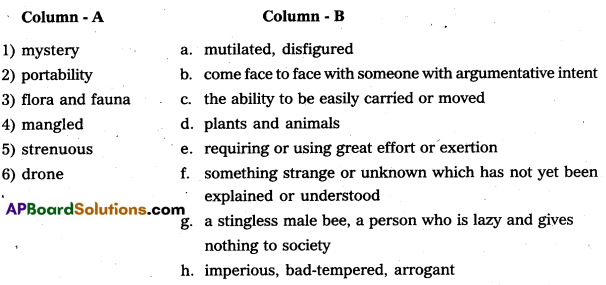
Answer:
1) f
2) c
3) d
4) a
5) e
6) g
XVII. Read the following table and interpret it in a paragraph. (5 × 1 = 5)
Trend in Average Annual Drop – Out Rate at different stages of School Education.

Source: Census of India, Office of the Registrar General, India.
Answer:
Primary, supper primary and Secondary Schools and the dropout rate of these different schools during the four years are given. In the year 2011-12 in the Primary Section there was a dropout rate of 5.3 in girls and 5.9 in boys. In the same year in the upper primary level dropout rate was 3.2 in girls and 2.1 in boys. Similarly when the secondary level was observed in the same year there were no dropouts available. Of the four years the number of female dropouts in 2014 -15 was very with 3.9 and the male drops were low in the same year (ie) 2014-15. IN the upper Primary section the lower number of female students was seen in the year 2011-12 and the male student dropouts were low in 2011-12 only and at the Secondary level the lowest female dropout occured in 2012-13 and the lowest male dropouts also happened in 2012-13 only. Thus it is the history of dropouts during the four years.
OR
Responding to your invitation your city friend is coming to your village to spend a few days. You have sent him the following whatsapp message describing the directions.
On reaching the exit gate at the railway station you see the main road with big neem trees on the either side. Take left. After a few minutes’ walk you reach Gandhibomma Centre. From there turn right. Move along the road a few yards ahead. You see the Panchayat Office on your right. Just opposite the office you see the village pond. Take the lane on your left. You will notice three houses in one compound facing the pond. The first one is ours. Draw a route map using this information with land marks and arrow marks.
Answer:
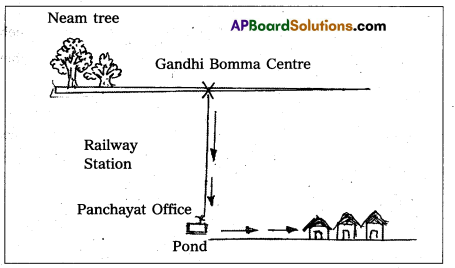
![]()
XVIII. Read the following transactions and write ANY FIVE words in ordinary spelling. (5 × 1 = 5)
a. /saiklist/
Answer:
cyclist
b. /novlti/
Answer:
novelty
c. /e0nik/
Answer:
ethnik
d. /hæpines/
Answer:
happiness
e. /mǝubail/
Answer:
mobile
f. /popij uleisn/
Answer:
population
g. /tsa:ns/
Answer:
chance
h. /brait/
Answer:
bright
i. /ha:məni/
Answer:
harmony
j. /fiǝ(r)/
Answer:
fear
OR
Find the word that is different from the other words in the group with regard to the sound of the underlined letters.
a. game gross gymnast
Answer:
gymnast
b. lit sit site
Answer:
site
c. earth easter easy
Answer:
earth
d. universe university ulcer
Answer:
ulcer
e. litre night like
Answer:
litre
XIX. Write the number of syllables for ANY SIX of the following words : (6 × 1/2 = 3)
a. suspend
Answer:
Disyllabic
(2 syllables)
b. formation
Answer:
Trisyllabic
(3 syllables)
c. symbolison
Answer:
Polysyllabic
(4 syllables)
d. vulnerability
Answer:
Polysyllabic
(5 syllables)
e. bound
Answer:
monosyllabic
(1 syllable)
f. savy
Answer:
Disyllabic
(2 syllables)
g. penury
Answer:
Trisyllabic
(3 syllables)
h. ability
Answer:
polysyllabic
(4 syllables)
i. screen
Answer:
Monosyllabic
(1 syllable)
j. vindictive
Answer:
Trisyllabic
(3 syllables)
XX. Complete the following dialogue : (4 × 1 = 4)
Anil : Hi what’s going on!
Siril : Good! Thanks, how about you?
Anil : Good! where are you ………… now?
Siril : At shoes factory. But I’m trying to find another job.
Anil : Really? Why?
Siril : You know? I’ve been working there for more than 6 years, but I can’t even buy a …………
Anil : But do you like the job? the people ?
Siril : Yes of course. The place is nice and the ……. are too.
Anil : Well, if you like the job and the work place, I suggest that you apply a ………. for a house.
Answer:
Anil : Hi what’s going on!
Siril : Good! Thanks, how about you?
Anil : Good! where are you ……. now?
Answer: working
Siril : At shoes factory. But I’m trying to find another job.
Anil : Really? Why?
Siril : You know? I’ve been working there for more than 6 years, but I can’t even buy a ………
Answer: bycle.
Anil : But do you like the job? the people ?
Siril : Yes of course. The place is nice and the …… are too.
Ans. people.
Anil : Well, if you like the job and the work place, I suggest that you apply a …….. for a house.
Answer: loan
